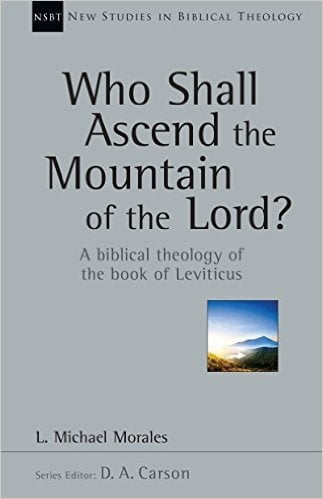⏱️ Estimated Reading Time: 4 min read
Many Christians today would probably argue that a deep study of Leviticus would be extremely difficult. I’m willing to bet that some would take it a step further in saying that it is a book not truly worth studying. After all, what is the point of Leviticus, especially as it relates to the 21st-century Church? Isn’t the book of Leviticus only an outlining of many various Israelite laws that no longer apply to us? The silence surrounding Leviticus from the pulpit and the lack of its presence in Bible study have caused many to nearly place it out of the canon. But God’s Word is complete with Leviticus, and it still has much to teach us. Perhaps more than we thought.
In Morales’s volume, part of the New Studies in Biblical Theology series, we are quite convicted by our lack of studying this important book of Scripture. Who Shall Ascend the Mountain of the LORD? does three things masterfully: 1) it reshapes our common understanding of the Old Testament narrative, primarily through the lens of the Pentateuch; 2) although it is not a verse-by-verse exposition of the book, this book’s style helps us know how to exposit Leviticus, by understanding the themes and implications and the storyline at every turn; 3) it takes scholarship-level material and outlines practical applications every Christian can profit from. In this review, I will speak to the first point specifically.
When I first picked up this volume, I assumed that it would refine my understanding of Leviticus solely, but I was quite wrong. In fact, the volume opens up with three magnificent chapters that are worth the price of the book, and that’s before you even really get into the book. Who Shall Ascend the Mountain of the LORD? begins with a structuring of the Pentateuch, showing that it is “not likely to have been coincidental” (24) that Leviticus is the middle book of the Pentateuch. In fact, Morales asserts, Leviticus is the peak, the central point of it. Morales takes it even a step further, saying that the whole of the Pentateuch is pointing towards the summit of Leviticus 16 specifically. Morales employs various chiasms and charts and graphs to illustrate this strong point. He summarizes the main theme of these five books as “YHWH’s opening a way for humanity to dwell in the divine Presence” (39).
Chapters 2 and 3 are focused on Genesis and Exodus, respectively. It is in these chapters where Morales seeks to unlock the centrality of atonement and the temple structure, and how that is what Eden and the Israelite exodus are ultimate pointing to. The parallels are not only a proof of Morales’s superior intellect but of the power of Scripture’s self-attestation. For example, on page 42, Morales outlines that the cosmos and the tabernacle are “constructed for the same purpose.” He outlines the parallels between the ark and the Levitical temple on page 59. Perhaps his most interesting parallel is when Morales compares Eden to the “Holy of Holies.” Such comparisons force the reader to see Scripture as telling one story, and further, to see the massive significance of Leviticus in developing the storyline laid out in Genesis and Exodus.
Finally getting to Leviticus itself, Morales reminds us that “the tabernacle is not only God’s house, the place of his Presence but is the ordained way of approaching the divine Presence” (109). Morales breaks up his analysis of Leviticus into three “dramatic movements” of approaching the house of God (Lev. 1-10), cleansing the house of God (Lev. 11-16), and meeting with God at the house of God (Lev. 17-27). These are major divisions, but Morales does a wonderful job emphasizing the main narrative points, continually showing how a particular passage or verse carries major significance within the greater story. He finishes the book with two riveting chapters on moving from the tabernacle to, indeed, ascending the mountain of Zion, and then ascending to the true “Mount Zion” in union with Him, in the midst of His presence once and for all.
Who Shall Ascend the Mountain of the LORD? as Carson says in his endorsement, will likely be the spark of a great sermon series on this often-neglected book of the Bible. This book makes me want to preach on Leviticus! It is simply brilliant. Everything from the wide range notations to the frequent use of graphs makes this volume a must-have for your NSBT collection.



